| Listing 1 - 10 of 27 | << page >> |
Sort by
|
Book
ISBN: 3540067205 0387067205 3540380124 9783540067207 9780387067209 Year: 1974 Volume: 5 Publisher: Berlin Springer
Abstract | Keywords | Export | Availability | Bookmark
 Loading...
Loading...Choose an application
- Reference Manager
- EndNote
- RefWorks (Direct export to RefWorks)
Computer. Automation --- #TCPW P3.0 --- 681.3*A0 --- 681.3*F0 --- General --- Computerwetenschap--?*F0 --- 681.3*A0 General --- Computer programming --- Programming languages (Electronic computers) --- Programmation (Informatique) --- Langages de programmation --- Congresses --- Congrès --- Congrès --- Logic design. --- Logics and Meanings of Programs. --- Design, Logic --- Design of logic systems --- Digital electronics --- Electronic circuit design --- Logic circuits --- Machine theory --- Switching theory

ISBN: 3540114904 3540391762 9783540114901 Year: 1982 Volume: 134 Publisher: Berlin ; Heidelberg ; New York, NY : Springer-Verlag,
Abstract | Keywords | Export | Availability | Bookmark
 Loading...
Loading...Choose an application
- Reference Manager
- EndNote
- RefWorks (Direct export to RefWorks)
Programming --- Computer programs --- Specifications --- Congresses --- 681.3*D1 --- 681.3*D21 --- 681.3*F3 --- Programming techniques--See also {681.3*E} --- Requirements/specifications: languages; methodologies; tools (Software engineering)--See also {681.3*D31} --- Logics and meanings of programs (Theory of computation) --- 681.3*F3 Logics and meanings of programs (Theory of computation) --- 681.3*D21 Requirements/specifications: languages; methodologies; tools (Software engineering)--See also {681.3*D31} --- 681.3*D1 Programming techniques--See also {681.3*E} --- Logic design. --- Software engineering. --- Logics and Meanings of Programs. --- Software Engineering. --- Computer software engineering --- Engineering --- Design, Logic --- Design of logic systems --- Digital electronics --- Electronic circuit design --- Logic circuits --- Machine theory --- Switching theory --- Computer programs - Specifications - Congresses
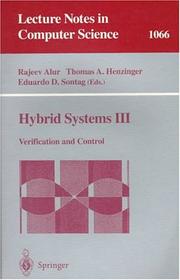
ISBN: 354061155X 3540683348 9783540611554 Year: 1996 Volume: 1066 Publisher: Berlin [etc.] : Springer-Verlag,
Abstract | Keywords | Export | Availability | Bookmark
 Loading...
Loading...Choose an application
- Reference Manager
- EndNote
- RefWorks (Direct export to RefWorks)
This reference book documents the scientific outcome of the DIMACS/SYCON Workshop on Verification and Control of Hybrid Systems, held at Rutgers University in New Brunswick, NJ, in October 1995. A hybrid system consists of digital devices that interact with analog environments. Computer science contributes expertise on the analog aspects of this emerging field of interdisciplinary research and design. The 48 revised full papers included were strictly refereed; they present the state of the art in this dynamic field with contributions by leading experts. Also available are the predecessor volumes published in the same series as LNCS 999 and LNCS 736.
Digital control systems --- Hybrid computers --- Commande numérique --- Calculateurs hybrides --- Congresses --- Congrès --- Commande numérique --- Congrès --- Computer science. --- Information theory. --- Computer network architectures. --- Software engineering. --- Logic design. --- Processor Architectures. --- Theory of Computation. --- Computer System Implementation. --- Special Purpose and Application-Based Systems. --- Software Engineering. --- Logics and Meanings of Programs. --- Design, Logic --- Design of logic systems --- Digital electronics --- Electronic circuit design --- Logic circuits --- Machine theory --- Switching theory --- Computer software engineering --- Engineering --- Architectures, Computer network --- Network architectures, Computer --- Computer architecture --- Communication theory --- Communication --- Cybernetics --- Informatics --- Science --- Hybrid computers - Congresses --- Digital control systems - Congresses
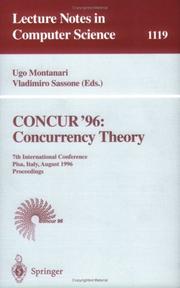
ISBN: 3540616047 3540706259 9783540616047 Year: 1996 Volume: 1119 Publisher: Berlin [etc.] : Springer-Verlag,
Abstract | Keywords | Export | Availability | Bookmark
 Loading...
Loading...Choose an application
- Reference Manager
- EndNote
- RefWorks (Direct export to RefWorks)
This book constitutes the refereed proceedings of the 7th International Conference on Concurrency Theory, CONCUR '96, held in Pisa, Italy, in August 1996. The volume presents 37 revised full papers selected from a total of 133 submissions; also included are seven invited papers. The contributions are grouped into topical sections on process algebras, categorical approaches, the pi-calculus, decidability and complexity, probability, functional and constraint programming, Petri nets, verification, automata and causality, practical models, and shared-memory systems.
Parallel processing (Electronic computers) --- Parallélisme (Informatique) --- Congresses --- Congrès --- Parallelisme (Informatique) --- Parallélisme (Informatique) --- Congrès --- Information theory. --- Computer network architectures. --- Software engineering. --- Logic design. --- Computer science. --- Theory of Computation. --- Computer System Implementation. --- Software Engineering/Programming and Operating Systems. --- Logics and Meanings of Programs. --- Computation by Abstract Devices. --- Programming Languages, Compilers, Interpreters. --- Informatics --- Science --- Design, Logic --- Design of logic systems --- Digital electronics --- Electronic circuit design --- Logic circuits --- Machine theory --- Switching theory --- Computer software engineering --- Engineering --- Architectures, Computer network --- Network architectures, Computer --- Computer architecture --- Communication theory --- Communication --- Cybernetics --- Parallelisme (Informatique) - Congres
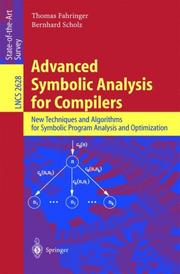
ISBN: 3540011854 3540366148 9783540011859 Year: 2003 Volume: 2628 Publisher: Berlin, Heidelberg : Springer Berlin Heidelberg : Imprint: Springer,
Abstract | Keywords | Export | Availability | Bookmark
 Loading...
Loading...Choose an application
- Reference Manager
- EndNote
- RefWorks (Direct export to RefWorks)
The objective of program analysis is to automatically determine the p- perties of a program. Tools of software development, such as compilers, p- formance estimators, debuggers, reverse-engineering tools, program veri?- tion/testing/proving systems, program comprehension systems, and program specializationtoolsarelargelydependentonprogramanalysis. Advancedp- gram analysis can: help to ?nd program errors; detect and tune performan- critical code regions; ensure assumed constraints on data are not violated; tailor a generic program to suit a speci?c application; reverse-engineer so- ware modules, etc. A prominent program analysis technique is symbolic a- lysis, which has attracted substantial attention for many years as it is not dependent on executing a program to examine the semantics of a program, and it can yield very elegant formulations of many analyses. Moreover, the complexity of symbolic analysis can be largely independent of the input data size of a program and of the size of the machine on which the program is being executed. In this book we present novel symbolic control and data ?ow repres- tation techniques as well as symbolic techniques and algorithms to analyze and optimize programs. Program contexts which de?ne a new symbolic - scription of program semantics for control and data ?ow analysis are at the center of our approach. We have solved a number of problems encountered in program analysis by using program contexts. Our solution methods are e?cient, versatile, uni?ed, and more general (they cope with regular and irregular codes) than most existing methods.
Compilers (Computer programs) --- Computer algorithms. --- Computer algorithms --- Computer Science --- Engineering & Applied Sciences --- Compiling programs (Computer programs) --- Computer science. --- Software engineering. --- Programming languages (Electronic computers). --- Operating systems (Computers). --- Computer logic. --- Computer Science. --- Software Engineering/Programming and Operating Systems. --- Programming Languages, Compilers, Interpreters. --- Software Engineering. --- Operating Systems. --- Logics and Meanings of Programs. --- Algorithms --- Computer programs --- Programming software --- Systems software --- Logic design. --- Design, Logic --- Design of logic systems --- Digital electronics --- Electronic circuit design --- Logic circuits --- Machine theory --- Switching theory --- Computer operating systems --- Computers --- Disk operating systems --- Informatics --- Science --- Computer software engineering --- Engineering --- Operating systems --- Computer science logic --- Logic, Symbolic and mathematical --- Computer languages --- Computer program languages --- Computer programming languages --- Machine language --- Electronic data processing --- Languages, Artificial
Book
ISBN: 0857290177 0857290185 9780857290175 Year: 2011 Publisher: London : Springer London : Imprint: Springer,
Abstract | Keywords | Export | Availability | Bookmark
 Loading...
Loading...Choose an application
- Reference Manager
- EndNote
- RefWorks (Direct export to RefWorks)
The use of mathematical methods in the development of software is essential when reliable systems are sought; in particular they are now strongly recommended by the official norms adopted in the production of critical software. Program Verification is the area of computer science that studies mathematical methods for checking that a program conforms to its specification. This text is a self-contained introduction to program verification using logic-based methods, presented in the broader context of formal methods for software engineering. The idea of specifying the behaviour of individual software components by attaching contracts to them is now a widely followed approach in program development, which has given rise notably to the development of a number of behavioural interface specification languages and program verification tools. A foundation for the static verification of programs based on contract-annotated routines is laid out in the book. These can be independently verified, which provides a modular approach to the verification of software. The text assumes only basic knowledge of standard mathematical concepts that should be familiar to any computer science student. It includes a self-contained introduction to propositional logic and first-order reasoning with theories, followed by a study of program verification that combines theoretical and practical aspects -- from a program logic (a variant of Hoare logic for programs containing user-provided annotations) to the use of a realistic tool for the verification of C programs (annotated using the ACSL specification language), through the generation of verification conditions and the static verification of runtime errors.
Computer algorithms. --- Computer software -- Development. --- Computer software -- Verification. --- Computer software --- Engineering & Applied Sciences --- Computer Science --- Verification --- Development --- Information Technology --- Software Engineering --- Development. --- Development of computer software --- Software development --- Computer science. --- Software engineering. --- Computer logic. --- Computer science --- Computer Science. --- Software Engineering. --- Logics and Meanings of Programs. --- Symbolic and Algebraic Manipulation. --- Mathematics. --- Logic design. --- Algebra --- Data processing. --- Design, Logic --- Design of logic systems --- Digital electronics --- Electronic circuit design --- Logic circuits --- Machine theory --- Switching theory --- Computer software engineering --- Engineering --- Computer science—Mathematics. --- Computer science logic --- Logic, Symbolic and mathematical --- Logic design --- ALGEBRA - data processing --- Computer Science Logic and Foundations of Programming. --- Computer mathematics --- Electronic data processing --- Mathematics --- Informatics --- Science --- ALGEBRA
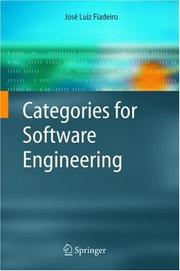
ISBN: 3540209093 9783540209096 3642058884 354026891X Year: 2005 Publisher: Berlin, Heidelberg : Springer Berlin Heidelberg : Imprint: Springer,
Abstract | Keywords | Export | Availability | Bookmark
 Loading...
Loading...Choose an application
- Reference Manager
- EndNote
- RefWorks (Direct export to RefWorks)
This book provides a gentle, software engineering oriented introduction to category theory. Assuming only a minimum of mathematical preparation, this book explores the use of categorical constructions from the point of view of the methods and techniques that have been proposed for the engineering of complex software systems: object-oriented development, software architectures, logical and algebraic specification techniques, models of concurrency, inter alia. After two parts in which basic and more advanced categorical concepts and techniques are introduced, the book illustrates their application to the semantics of CommUnity – a language for the architectural design of interactive systems. "For computer scientists, this unique book presents Category Theory in a manner tailored to their interests and with examples to which they can relate." Ira Forman, IBM "This book applies little-known yet quite powerful formal tools from category theory to software structures: designs, architectures, patterns, and styles. Rather than focus on issues at the level of computational models and semantics, it instead applies these tools to some of the problems facing the sophisticated software architect. The terminology and mind set (Parts 1 and 2), while different from many common approaches, can provide startlingly concise expression of key properties of software systems (Part 3), and give rigorous meaning to entire families of box-and-line architecture drawings. It is applicable to the formal specification, decomposition, and composition of service-oriented architectures." Desmond D'Souza, Kinetium.
Computer software --- Categories (Mathematics) --- Development --- Information Technology --- Software Engineering --- Development. --- Software engineering. --- Computer science. --- Logic design. --- Software Engineering/Programming and Operating Systems. --- Software Engineering. --- Programming Techniques. --- Programming Languages, Compilers, Interpreters. --- Logics and Meanings of Programs. --- Mathematics of Computing. --- Design, Logic --- Design of logic systems --- Digital electronics --- Electronic circuit design --- Logic circuits --- Machine theory --- Switching theory --- Informatics --- Science --- Computer software engineering --- Engineering --- 681.3*D2 --- 681.3*D2 Software engineering: protection mechanisms; standards--See also {681.3*K63}; {681.3*K51} --- Software engineering: protection mechanisms; standards--See also {681.3*K63}; {681.3*K51} --- Development of computer software --- Software development --- Category theory (Mathematics) --- Algebra, Homological --- Algebra, Universal --- Group theory --- Logic, Symbolic and mathematical --- Topology --- Functor theory --- Computer programming. --- Programming languages (Electronic computers). --- Computer logic. --- Computer science—Mathematics. --- Computer science logic --- Computer languages --- Computer program languages --- Computer programming languages --- Machine language --- Electronic data processing --- Languages, Artificial --- Computers --- Electronic computer programming --- Electronic digital computers --- Programming (Electronic computers) --- Coding theory --- Programming --- Computer software - Development
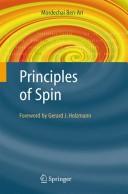
ISBN: 1846287707 1846287693 9781846287695 9781846287701 Year: 2008 Publisher: London : Springer London : Imprint: Springer,
Abstract | Keywords | Export | Availability | Bookmark
 Loading...
Loading...Choose an application
- Reference Manager
- EndNote
- RefWorks (Direct export to RefWorks)
The Spin model checker is a widely used professional software tool for specifying and verifying concurrent and distributed systems. Models, written in a simple language called Promela, can be simulated randomly or interactively. Spin can generate efficient verifiers that search for a counterexample to correctness specifications applied to a model. Spin is also a superb tool for teaching important concepts of computer science such as verification, concurrency and nondeterminism. The Promela language is easy to learn, as is the linear temporal logic used for correctness specifications, and the techniques for simulating and verifying models. Principles of Spin is an introductory book for students and practicing software engineers who wish to learn Promela and Spin. The presentation starts with the verification of sequential programs and proceeds in gradual stages to the verification of concurrent and then distributed programs. Complete programs are used to demonstrate each construct and concept, and the source code of these programs, together with that of longer case studies, are available on the companion website. The book describes free software that the author has developed: jSpin—an integrated development environment for Spin, SpinSpider—a visualization tool that automatically constructs graphical state diagrams of concurrent programs, and VN—a Spin-based tool for visualizing nondeterminism of finite automata. Mordechai Ben-Ari is an associate professor in the Department of Science Teaching of the Weizmann Institute of Science. He is the author of numerous textbooks on concurrency, programming languages and logic, and has developed software tools for teaching concurrency. In 2004, Ben-Ari received the ACM/SIGCSE Award for Outstanding Contributions to Computer Science Education.
Computer software --- Verification. --- SPIN (Computer file) --- Software verification --- Verification of software --- Software engineering. --- Computer science. --- Operating systems (Computers). --- Information theory. --- Logic design. --- Software Engineering/Programming and Operating Systems. --- Programming Techniques. --- Programming Languages, Compilers, Interpreters. --- Operating Systems. --- Theory of Computation. --- Logics and Meanings of Programs. --- Design, Logic --- Design of logic systems --- Digital electronics --- Electronic circuit design --- Logic circuits --- Machine theory --- Switching theory --- Communication theory --- Communication --- Cybernetics --- Computer operating systems --- Computers --- Disk operating systems --- Systems software --- Informatics --- Science --- Computer software engineering --- Engineering --- Operating systems --- Computer programming. --- Programming languages (Electronic computers). --- Computers. --- Computer logic. --- Computer science logic --- Logic, Symbolic and mathematical --- Automatic computers --- Automatic data processors --- Computer hardware --- Computing machines (Computers) --- Electronic brains --- Electronic calculating-machines --- Electronic computers --- Hardware, Computer --- Computer systems --- Calculators --- Cyberspace --- Computer languages --- Computer program languages --- Computer programming languages --- Machine language --- Electronic data processing --- Languages, Artificial --- Electronic computer programming --- Electronic digital computers --- Programming (Electronic computers) --- Coding theory --- Programming --- Computer software - Verification --- Logiciels --- Vérification --- EPUB-LIV-FT SPRINGER-B LIVINFOR
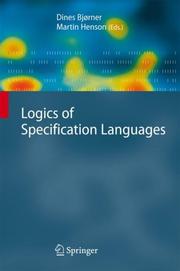
ISBN: 3540741062 9783540741060 9786611133641 1281133647 3540741070 Year: 2008 Publisher: Berlin, Heidelberg : Springer Berlin Heidelberg : Imprint: Springer,
Abstract | Keywords | Export | Availability | Bookmark
 Loading...
Loading...Choose an application
- Reference Manager
- EndNote
- RefWorks (Direct export to RefWorks)
By a specification language we understand a formal system of syntax, semantics and proof rules. The syntax and semantics define a language; the proof rules define a proof system. Specifications are expressions in the language, and reasoning over properties of these specifications is done within the proof system. This book presents comprehensive studies on nine specification languages and their logics of reasoning. The editors and authors are authorities on these specification languages and their application. Dedicated chapters address: the use of ASM (Abstract State Machines) in the classroom; the Event-B modelling method; a methodological guide to CafeOBJ logic; CASL, the Common Algebraic Specification Language; the Duration Calculus; the logic of the RAISE specification language (RSL); the specification language TLA+; the typed logic of partial functions and the Vienna Development Method (VDM); and Z logic and its applications. Each chapter is self-contained, with references, and symbol and concept indexes. Finally, in a unique feature, the book closes with short commentaries on the specification languages written by researchers closely associated with their original development. With extensive references and pointers to future developments, this book will be of interest to researchers and graduate students engaged with formal specification languages.
Programming languages (Electronic computers) --- Logic, symbolic and mathematical --- Semantics --- Logic, Symbolic and mathematical. --- Semantics. --- Computer science. --- Software engineering. --- Logic design. --- Information theory. --- Mathematical Logic and Formal Languages. --- Software Engineering. --- Logics and Meanings of Programs. --- Theory of Computation. --- Communication theory --- Communication --- Cybernetics --- Design, Logic --- Design of logic systems --- Digital electronics --- Electronic circuit design --- Logic circuits --- Machine theory --- Switching theory --- Computer software engineering --- Engineering --- Informatics --- Science --- Mathematical logic. --- Computer logic. --- Computers. --- Automatic computers --- Automatic data processors --- Computer hardware --- Computing machines (Computers) --- Electronic brains --- Electronic calculating-machines --- Electronic computers --- Hardware, Computer --- Computer systems --- Calculators --- Cyberspace --- Computer science logic --- Logic, Symbolic and mathematical --- Algebra of logic --- Logic, Universal --- Mathematical logic --- Symbolic and mathematical logic --- Symbolic logic --- Mathematics --- Algebra, Abstract --- Metamathematics --- Set theory --- Syllogism --- Programming languages (Electronic computers) - Semantics
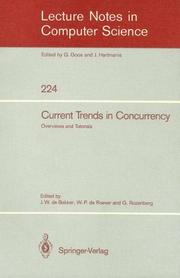
ISBN: 354016488X 038716488X 3540398279 9780387164885 9783540164883 Year: 1986 Volume: 224 Publisher: Berlin : Springer-Verlag,
Abstract | Keywords | Export | Availability | Bookmark
 Loading...
Loading...Choose an application
- Reference Manager
- EndNote
- RefWorks (Direct export to RefWorks)
Computer science --- 681.3 *C2 --- 681.3*B1 --- 681.3*C1 --- 681.3*D4 --- 681.3*D41 --- Computer communication networks: data communications; OSI; security and protection --- Control structures and microprogramming--(hardware) --- Processor architectures (Computer systems organization) --- Operating systems--See also {681.3*C} --- Process management: concurrency; deadlocks; multiprocessing/multiprogramming;mutual exclusion; scheduling; synchronization (Operating systems) --- 681.3*D41 Process management: concurrency; deadlocks; multiprocessing/multiprogramming;mutual exclusion; scheduling; synchronization (Operating systems) --- 681.3*D4 Operating systems--See also {681.3*C} --- 681.3*C1 Processor architectures (Computer systems organization) --- 681.3*B1 Control structures and microprogramming--(hardware) --- 681.3 *C2 Computer communication networks: data communications; OSI; security and protection --- Software engineering. --- Computer science. --- Logic design. --- Software Engineering/Programming and Operating Systems. --- Programming Techniques. --- Logics and Meanings of Programs. --- Models and Principles. --- Design, Logic --- Design of logic systems --- Digital electronics --- Electronic circuit design --- Logic circuits --- Machine theory --- Switching theory --- Informatics --- Science --- Computer software engineering --- Engineering
| Listing 1 - 10 of 27 | << page >> |
Sort by
|

 Search
Search Feedback
Feedback About
About Help
Help News
News